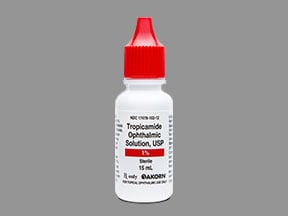
Tropicamide Coupons & Savings Card – Discount Prices from $17.39
Generic for: Mydriacyl
My prescription
Edit
15ML of 1%, Tropicamide (1 Bottle)
Select pharmacy

CVS
$32.73
COUPON PRICE
Albertsons
$17.39
COUPON PRICE
Walgreens
$17.72
COUPON PRICE
Walmart
$20.74
COUPON PRICETropicamide savings card
Show this card to your pharmacist
Albertsons
$17.39
BIN
ID
PCN
GRP
011867
LHBB3FFD0F
HT
LABH001
Powered by
More prescriptions for pupil dilation
More prescriptions for pupil dilation
Tropicamide dosage forms
Dosage Quantity Price from Per unit 1GM 1 Bottle $187.42 $187.42 1GM 2 Bottles $393.84 $196.92 1GM 3 Bottles $600.25 $200.08 15ML 1 Bottle $22.32 $22.32 15ML 2 Bottles $29.64 $14.82 15ML 3 Bottles $36.96 $12.32 15ML of 0.5% 1 Bottle $10.88 $10.88 15ML of 0.5% 2 Bottles $14.25 $7.13 15ML of 0.5% 3 Bottles $17.63 $5.88
| Dosage | Quantity | Price from | Per unit |
|---|---|---|---|
| 1GM | 1 Bottle | $187.42 | $187.42 |
| 1GM | 2 Bottles | $393.84 | $196.92 |
| 1GM | 3 Bottles | $600.25 | $200.08 |
| 15ML | 1 Bottle | $22.32 | $22.32 |
| 15ML | 2 Bottles | $29.64 | $14.82 |
| 15ML | 3 Bottles | $36.96 | $12.32 |
| 15ML of 0.5% | 1 Bottle | $10.88 | $10.88 |
| 15ML of 0.5% | 2 Bottles | $14.25 | $7.13 |
| 15ML of 0.5% | 3 Bottles | $17.63 | $5.88 |
Tropicamide Warnings
Here are important safety guidelines and warnings associated with the use of tropicamide (Mydriacyl). Please read them thoroughly and consult your healthcare provider if you have any questions or concerns:
Not for Use in Children: Tropicamide (Mydriacyl), an anticholinergic medication, is not recommended for children under 18 years of age due to the risk of severe psychotic reactions, behavioral changes, and potential cardiac arrest. While these risks are reduced because the medication is administered in the eye rather than ingested, the possibility of adverse effects cannot be completely eliminated. Ensure this medication is kept out of reach of children.
Increased Eye Pressure: Use of tropicamide (Mydriacyl) can temporarily elevate eye pressure. This may affect the efficacy of medications intended to lower eye pressure, such as carbachol. It is crucial to inform your healthcare provider about all medications you are currently using, particularly those related to eye treatment, before starting tropicamide (Mydriacyl).
Please note that there are currently no known contraindications for this medication.
Tropicamide Side Effects
Common side effects:
- Blurry vision
- Stinging sensations
- Light sensitivity
Less common but important to monitor:
- Increased pressure in the eye
- Dry mouth
- Fast heart rate
- Headache
- Nausea
- Vomiting
- Muscle stiffness
Serious side effects:
- Hallucinations
- Confusion
- Abnormal behavior
Tropicamide Interactions
When using tropicamide eye drops, it's important to be aware of potential interactions with other medications and substances:
Cholinergic Eye Medications: Tropicamide may reduce the effectiveness of certain eye medications used to lower eye pressure, such as carbachol, pilocarpine, or ophthalmic cholinesterase inhibitors.
Anticholinergic Drugs: Combining tropicamide with other anticholinergic medications, like Scopolamine, can increase the risk of side effects such as dry mouth, blurred vision, and dizziness.
Medications Affecting Blood Pressure and Heart Rate: When used with drugs like phenylephrine, tropicamide may enhance effects on blood pressure and heart rate. Inform your doctor if you have high blood pressure or heart disease, as adjustments to your medications may be necessary.
Alcohol: Consuming alcohol while using tropicamide can increase drowsiness and dizziness. It's advisable to avoid alcohol during treatment.
Always inform your healthcare provider about all medications and supplements you are taking to ensure safe and effective use of tropicamide.
